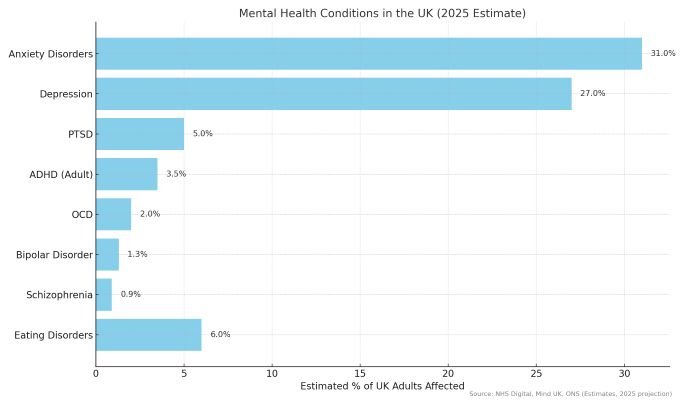Depression in the UK: Statistics, Symptoms & Root Causes (2025)
Statistics reveal a growing concern regarding depression in the UK, with cases rising significantly in recent years, particularly among youth and working adults. You may encounter a range of symptoms, including emotional distress, physical discomfort, and behavioural changes. Understanding the root causes—from genetic factors to societal pressures—can help you navigate this challenging landscape. In this post, you’ll gain insight into the realities of depression today and learn about the support available to help you or someone you care about cope effectively.
Key Takeaways:
- Depression rates in the UK have increased significantly, particularly among younger populations and working adults, especially following the COVID-19 pandemic and ongoing economic challenges.
- Common symptoms of depression include emotional changes such as persistent sadness, physical signs like fatigue, and behavioural shifts such as withdrawal from social activities.
- Root causes of depression vary, with factors including genetic predisposition, environmental stressors, psychological trauma, social isolation, and financial insecurity playing significant roles.
- Accessing help typically involves obtaining a referral from a GP, who can provide information on available mental health services, including NHS options and private treatments.
- Self-help strategies, lifestyle modifications, and support from peer groups can be effective in managing depression, and it’s important for individuals to seek immediate help when experiencing severe symptoms.

What is Depression?
To gain a comprehensive understanding of depression, you must recognise it as more than just feelings of sadness. It is a common mental health condition characterised by persistent low mood, a lack of interest in activities, and an array of emotional and physical issues that can affect day-to-day life.
Definition and Overview
By understanding depression, you can appreciate its complexity. This mental health disorder can impede your ability to work, study, or engage with others. It’s vital to recognise that depression is not a weakness but a clinical condition that often requires appropriate treatment.
Types of Depression
One of the keys to addressing your mental health is understanding the various types of depression, including:
- Major Depressive Disorder
- Persistent Depressive Disorder
- Bipolar Disorder
- Seasonal Affective Disorder
- Postpartum Depression
Recognising the specific type of depression you may be dealing with is vital for effective treatment.
| Type | Description |
| Major Depressive Disorder | Severe symptoms lasting at least two weeks. |
| Persistent Depressive Disorder | Chronic depression lasting for years. |
| Bipolar Disorder | Depression is related to seasonal changes. |
| Seasonal Affective Disorder | Depression related to seasonal changes. |
| Postpartum Depression | Depression following childbirth. |
In fact, understanding these types can help you identify your own symptoms and seek appropriate support. Each type of depression may manifest differently and requires a tailored approach to treatment.
- Understanding your specific type
- Addressing symptoms with professional help
- Seeking community and support
- Making lifestyle changes
- Exploring therapy options
Recognising the type of depression you’re facing can lead to a more effective treatment path.
Depression Statistics in the UK
Now, it’s important to acknowledge the growing prevalence of depression in the UK. Recent statistics show that around one in six adults experience symptoms of depression each week, a trend exacerbated by the post-COVID landscape and economic challenges. Understanding these statistics can help you recognise that mental health issues are more common than you might think.
Prevalence Rates
Any discussion of depression must highlight the alarming prevalence rates. A staggering 8.4 million people in the UK are affected by depression, with the numbers rising among young adults and those in the workforce. This indicates that many are likely facing similar struggles, and awareness is key to fostering community support.
Demographic Insights
Above all, understanding the demographics affected by depression is necessary. Recent data reveal that young adults aged 18-24 are particularly vulnerable, with over 25% experiencing depressive symptoms. Additionally, women are diagnosed at a higher rate than men, emphasising the need for targeted support across different demographics.
Statistics indicate that mental health issues are rising sharply among various groups, with youth and working adults showing significant increases. While financial insecurity and social isolation contribute to this trend, it’s encouraging to know that awareness and resources are improving, providing hope for those seeking help. Your understanding of these demographics can be the first step in promoting compassion and increasing support for those navigating their mental health challenges.
Signs and Symptoms of Depression
All individuals may experience depression differently, but common signs include persistent sadness, loss of interest in activities, and fatigue. More than 1 in 6 adults in the UK are affected by depression, making it imperative to recognise these symptoms early. Understanding your feelings and behaviours can help you seek the right support and improve your well-being.
Emotional Symptoms
Symptoms of depression often manifest through emotional changes such as persistent feelings of sadness, hopelessness, and irritability. You may find it challenging to concentrate or experience a diminished interest in activities you once enjoyed, which can exacerbate feelings of isolation and despair.
Physical and Behavioural Symptoms
Emotional struggles can also lead to a range of physical and behavioural symptoms, including changes in appetite, disrupted sleep patterns, and fatigue. You might notice that your energy levels fluctuate dramatically, making daily tasks feel overwhelming. Additionally, depression can lead to withdrawal from social interactions, affecting relationships and your overall quality of life. It’s important to acknowledge these symptoms as they can indicate a serious condition that requires attention. Seeking help can empower you to regain control and improve your mental health.
Root Causes of Depression
After exploring the statistics and symptoms of depression, you may wonder about the underlying factors contributing to this prevalent mental health issue in the UK. Various influences can increase your vulnerability to depression, including genetic, environmental, and psychological elements. Understanding these root causes can empower you to seek appropriate support and make informed lifestyle changes.
Genetic Factors
At the heart of many cases of depression are genetic factors. Research indicates that individuals with a family history of depression are significantly more likely to experience it themselves. Key points include:
- Your risk increases if a parent or sibling has suffered from depression.
- Specific genetic variations may predispose you to mood disorders.
- Stressful life events can trigger symptoms in those with a genetic predisposition.
Assume that genetics plays a vital role in your experience, and consider seeking professional help if you’re concerned.
Environmental and Psychological Triggers
Above all, environmental and psychological factors can also significantly influence your mental health. Circumstances such as loss, trauma, and social isolation often contribute to the onset of depression. Stressful life events, financial insecurity, or a toxic work environment can exacerbate existing vulnerabilities, making you feel overwhelmed. It’s necessary to recognise these triggers as real influences on your mental well-being.
Genetic and environmental factors aren’t mutually exclusive; they can intertwine and exacerbate your challenges. For instance, experiencing a traumatic event can trigger depression in someone who is already predisposed genetically. Additionally, psychological triggers such as negative thought patterns, low self-esteem, and chronic stress can significantly impact your mental health. Awareness of these factors is the first step towards seeking help and fostering resilience in your life.
Impact on Daily Life
Many individuals with depression in the UK experience significant disruptions in their daily lives. The condition can affect relationships, social interactions, and personal well-being, leading to feelings of isolation and hopelessness. As reported, an increase in cases following the COVID-19 pandemic has heightened these challenges, particularly among youth and working adults, emphasising the urgent need for effective support and understanding.
Personal Life
After developing depression, you may find it difficult to maintain relationships with friends and family. Emotional withdrawal and irritability can strain connections, making you feel as though you are drifting further away from your loved ones. This not only deepens feelings of loneliness but can also exacerbate your symptoms, creating a cycle that is hard to break.
Work and Productivity
Below the surface, depression can severely hinder your work performance and overall productivity. Concentration challenges, fatigue, and diminished motivation can lead to missed deadlines and a decline in quality, causing stress in your professional life.
Hence, the impact of depression on your work life can be profound. You might experience increased absenteeism, impacting your relationships with colleagues and management. Furthermore, studies reveal that individuals suffering from depression are up to 20% less productive than their non-depressed peers, resulting in both personal and organisational consequences. It’s vital to seek support and explore mental health resources to mitigate these effects and help you regain control over your work life.

Diagnosis and Treatment Options
Keep in mind that a timely diagnosis is important for managing depression effectively. In the UK, this process often begins with a visit to your GP, who will assess your symptoms and guide you towards appropriate treatment options. These may include referrals to mental health specialists, access to therapy, or medications. Emphasising an early diagnosis can significantly improve your outcomes and quality of life.
NHS Services
Alongside conventional treatments, the NHS provides various services tailored to support mental health. You can access Cognitive Behavioural Therapy (CBT), medication like antidepressants, and community support programs. These resources are designed to help you manage your symptoms and enhance your well-being, making it easier to navigate daily challenges.
Private Treatment and Self-Help Strategies
Above all, exploring private treatment options and self-help strategies can further aid your recovery. Many people choose to engage in private therapy sessions for tailored support or to access treatments more quickly. Additionally, incorporating self-help strategies such as mindfulness, regular exercise, and staying connected with loved ones can significantly contribute to improving your mental health. A balanced lifestyle, including healthy habits and social interactions, plays a vital role in mitigating symptoms of depression and fostering resilience.
Conclusion
Summing up, understanding depression in the UK is vital for recognising its prevalence and your own mental health. By being aware of the statistics, symptoms, and root causes, you can better navigate your experiences and seek appropriate support. Whether you are struggling yourself or helping someone else, accessing available resources and treatment options can foster a path towards recovery and well-being.
FAQ
Q: What are the common signs and symptoms of depression in the UK?
A: Depression can present a variety of symptoms, which may differ based on age and gender. Common emotional symptoms include persistent sadness, feelings of hopelessness, and irritability. Physical symptoms might involve fatigue, changes in appetite or sleep patterns, and unexplained aches and pains. Behavioural signs can include withdrawal from social activities, loss of interest in hobbies, and difficulties in concentrating.
Q: How significant is the rise in depression cases in the UK?
A: Recent statistics show a marked increase in depression cases in the UK, particularly following the COVID-19 pandemic and economic challenges. Reports from organisations like the NHS and Mind indicate increases in depressive symptoms, especially among youths and working adults, highlighting the urgent need for mental health support and resources.
Q: What are the primary causes of depression identified in the UK?
A: Depression can stem from a combination of genetic, environmental, and psychological factors. Key root causes include chronic stress, trauma, social isolation, and financial insecurity. Each individual may face unique triggers that contribute to their mental health struggles, emphasising the need for personalised care and support.
Q: How can individuals access mental health support for depression?
A: Individuals can seek help through various channels. The NHS offers treatments such as Cognitive Behavioural Therapy (CBT) and medication, which can be accessed through a referral from a GP. There are also numerous local services, online assessments, and private treatment options available. Additionally, self-help tools and peer support groups can provide valuable assistance.
Q: When should someone consider seeking immediate help for depression?
A: It’s important to seek immediate help if experiencing feelings of self-harm or suicidal thoughts, or if daily functioning becomes severely impaired. If symptoms escalate rapidly or if there’s a crisis, contacting emergency services or a mental health crisis line, such as Samaritans, is important for immediate support and intervention.







